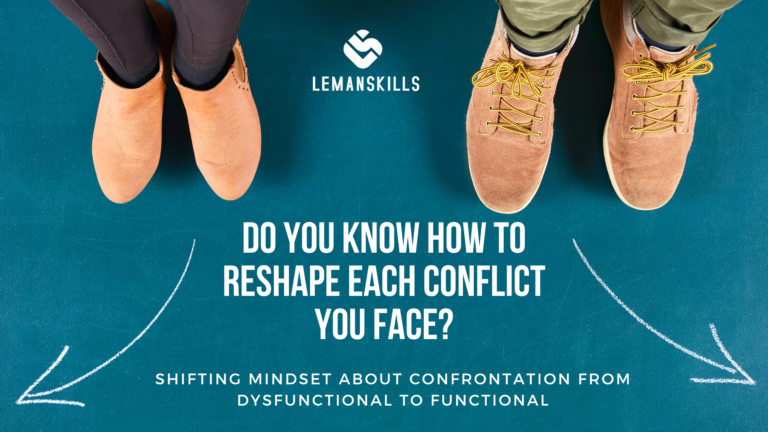
Team Conflict: Is It Always a Bad Thing?
When we hear “conflict”, we think “trouble”. When we hear “conflict”, we think “dysfunctional team”, where communication doesn’t work, and people have personal issues. Or when we hear “conflict”, we think that leader doesn’t know how to lead his/her team successfully. Is that really true? Why are we so scared of a conflict? What is the worst thing that can happen when there is a conflict in the team? What kind of experiences we have with the conflict that make us think and behave in a certain way when one appears? Why do we avoid conflict? The real question should be: why do we avoid doing things in overall? In the area of conflicts, it’s extremely visible: we avoid it, because we burned ourselves once or twice. Based on that we make this strategy to not get involved in any kind of “risky” situation: so, we sit quiet and just focus on living through another day. Is it really the best option we can get? When a lack of conflict is dysfunctional, not the other way around? One of the biggest experts of team development and leadership, Patrick Lencioni, years ago wrote a book “5 Disfunctions of a Team”. It is a really short story (doesn’t even look like a personal/professional development book), yet it’s very powerful. And there is one part that stopped me when I first read it: Lencioni says that one of the dysfunctions of a team is a fear of conflict. What? (On the chart on the left-hand side there are definitions of all disfunctions and on the right-hand side there are solutions, that answer the questions: what is the best thing we can do here for our teams?) If we stick to our old believe that a conflict is something negative and destructive – that it ruins the trust and good atmosphere in the team, how is it possible that it’s actually the other way around? When we avoid conflict, not speaking up and be open about what do we really think, feel, or observe in the workplace, there is a huge risk of not being as effective and efficient as possible. It’s also short sided: if we are not sharing it now, it’s going to backfire in the future. So, at the end of the day, it will bring worse result than we imagine now. What’s even worse, people probably will talk behind other colleagues’ or leader’s backs, and not saying anything out loud. We can imagine that it will bring even worse outcomes, like really ruining the atmosphere, creating space for psychological games and in a consequence: lack of trust. The fear of conflict can be one of the biggest barriers that will stop people from growth, thrive and being the best versions of themselves in a workplace. What can we do to change this mindset? How can we use conflict that nourishes our team? The key thing to understand is that a certain kind conflict is something that we can use. Sometimes it is, sometimes it isn’t, it really depends on what we are dealing with. There are 2 categories of conflicts, I call them functional and dysfunctional. What can we do with the dysfunctional conflicts? First and foremost: we need to map and name correctly which conflict is the real one in the situation we are dealing with. Without that, even the most beautiful strategy is not going to work, because we are going to answer to the wrong need. We’ll get frustrated and use all our energy badly. Focus on investigating will bring the best results, since then the solutions will be to the point: it’s more than certain that it’s worth investing time in this process. The bottom line The conflict is a huge, hairy, and scary thing that we often have very strong convictions about. We avoid it, by staying low, don’t speak up to not get into any confrontation. We do it because we don’t want to get hurt, expose ourselves to bad emotions, stress or feeling that we do not belong. Perfectly natural, there is nothing to be ashamed of. When we make a mindset shift: from fixed (focused on avoiding conflict) to a growth one, where we take into consideration that the conflict can be good for us, nourishing and interesting, we can gain more than we think. With remembering about having a good intention, being in OK-OK zone and with a goal of creating something extraordinary as a consequence of a passionate discussion, we can achieve the outcome that won’t be possible to achieve on our own. It puts old, good conflict in a completely new light. I believe it’s worth trying if it fits.
